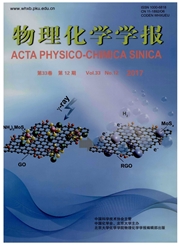

 中文摘要:
中文摘要:
在超重力条件下电沉积NiW合金镀层,考察了超重力对NiW合金电沉积过程(各元素分电流、W含量和槽电压等)的影响规律;并利用扫描电子显微镜(SEM)、Tafel技术和电化学阻抗谱(EIS)技术研究了电沉积NiW合金镀层的表面形貌和在NaOH溶液中的抗腐蚀性能,同时通过浸泡实验考察了镀层的稳定性.结果发现,与常重力条件电沉积的NiW合金相比,超重力场电沉积的NiW合金中W含量增加,镀层表面无微裂纹产生;在10%(w)NaOH溶液中镀层自腐蚀电位正移,自腐蚀电流密度减小,腐蚀电阻也由常重力(重力系数G=1)时的865Ω·cm2增大至超重力(G=256)时的2305Ω·cm2;在10%NaOH溶液中浸泡144h后,超重力场电沉积的NiW合金表面无破碎和起皮现象发生.超重力技术在NiW合金电沉积过程中的应用,使镀层的耐碱腐蚀性能得到改善.
 英文摘要:
英文摘要:
NiW alloys were electrodeposited under a super gravity field. The effects of super gravity on the partial current density, W content, and cell voltage were studied. The surface morphologies of the NiW films were characterized by scanning electron microscopy (SEM). The anti-corrosion properties and stability of the NiW films in NaOH solution were also studied by Tafel, electrochemical impedance spectroscopy (EIS), and 144 h exposure test. The results indicate that the W content increases with the gravity coefficient (G) and no cracks are produced on the surface of the NiW alloys electrodeposited under the super gravity field. Compared with those electrodeposited under normal gravity conditions, the self-corrosion potentials of the NiW alloys electrodeposited under a super gravity field shifts in a positive direction and the self-corrosion current densities become smaller. Meanwhile, the corrosion resistance also increases from 865 to 2305 Ω·cm2 with an increase in the G value from 1 to 256. After 144 h exposure in 10% (w) NaOH solution, no surface peeling or damage occur. We conclude that when the NiW alloy is electrodeposited under a super gravity field, both the anti-corrosion resistance and the stability of the NiW alloy in the NaOH solution are improved obviously.
 同期刊论文项目
同期刊论文项目
 同项目期刊论文
同项目期刊论文
 Preparation of electrolytic copper powders with high current efficiency enhanced by super gravity fi
Preparation of electrolytic copper powders with high current efficiency enhanced by super gravity fi 期刊信息
期刊信息
